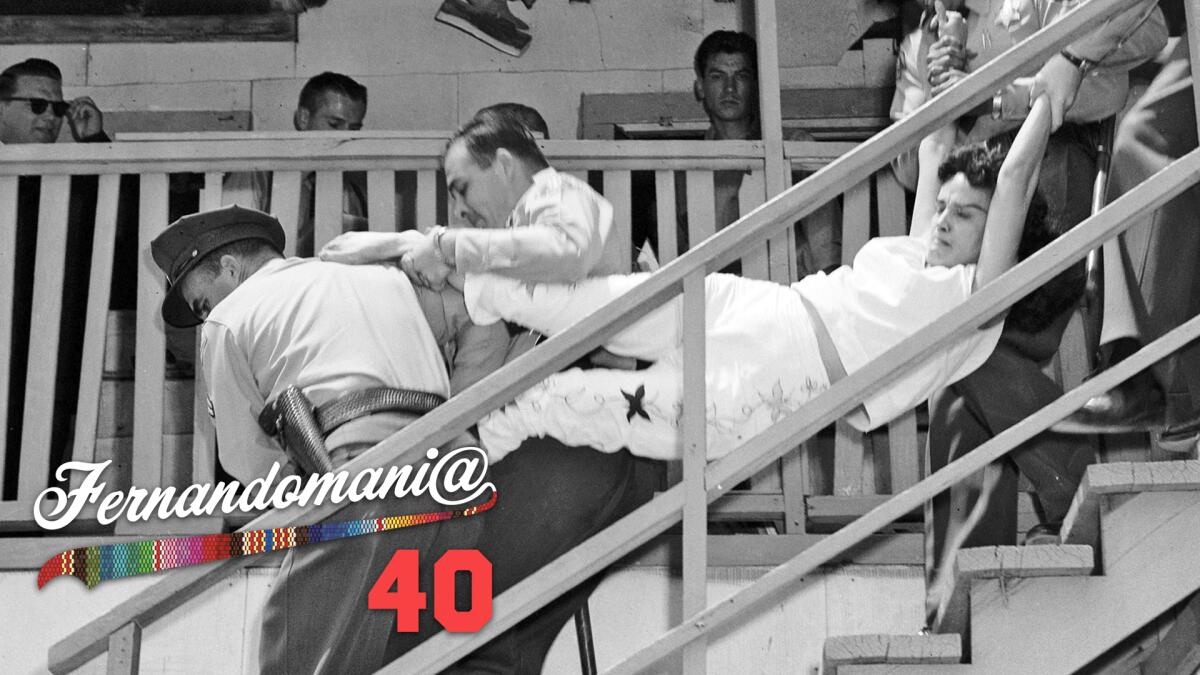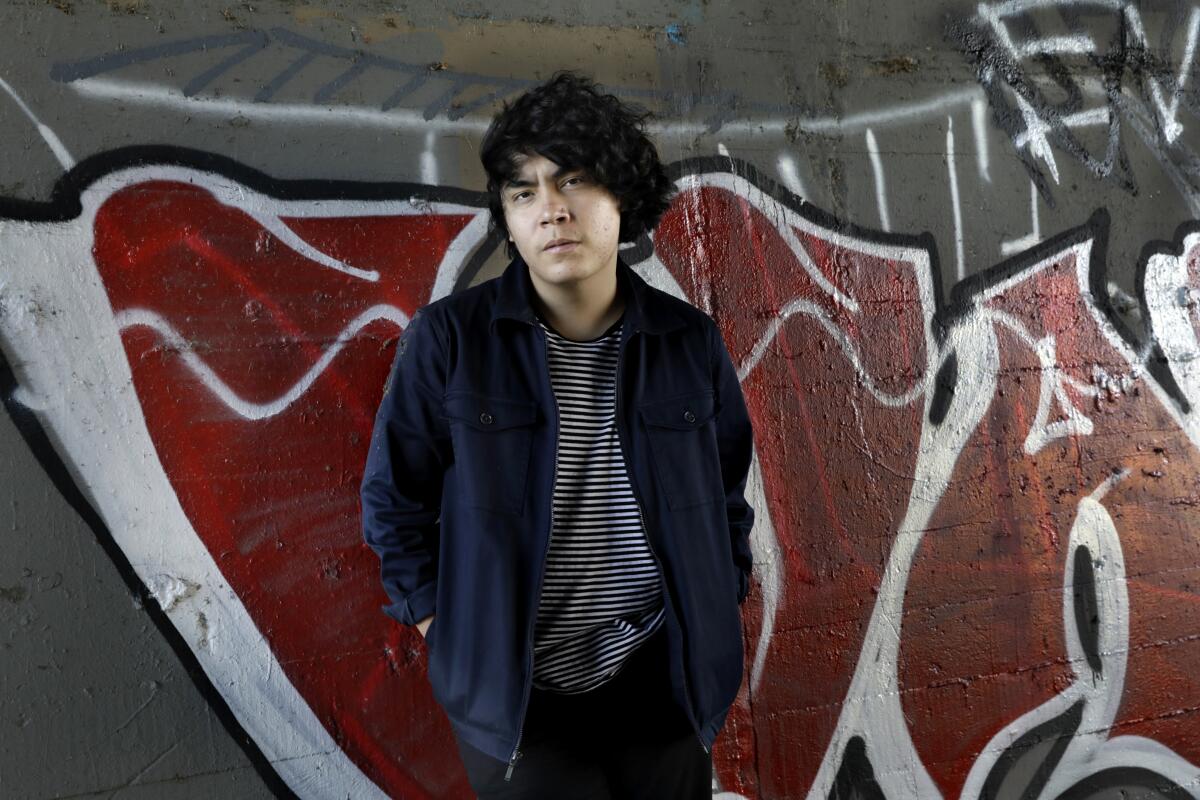Latinx Files: Cinco de Mayo means one thing, and it’s not margaritas
I grumbled the moment my editor suggested I write about Cinco de Mayo this week.
It’s not that I’m against the holiday or the way it’s celebrated. Sure, any mention of the word “drinko” would set me off on a tirade about cultural appropriation when I was younger. But as I’ve gotten older and with the advent of Twitter’s muted word function, I have come to just ignore it.
I largely live in a world free of obnoxious people looking for an excuse to get drunk under the guise of celebrating my Mexican heritage, so there’s no need to get on my soapbox about it. My thoughts on this holiday aren’t that deep. (In addition to any variant on “Cinco de Mayo,” my muted words include the phrase “unpopular opinion,” the hashtag #MayTheFourthBeWithYou and “Erewhon,” the super bougie L.A. supermarket.)
Truth be told, I lowkey like it when this time of the year rolls around for one reason, and one reason only: boxing.
The Latinx experience chronicled
Get the Latinx Files newsletter for stories that capture the multitudes within our communities.
You may occasionally receive promotional content from the Los Angeles Times.
Cinco de Mayo weekend — along with the weekend around Mexican Independence Day, which falls on Sept. 16 — is essentially the Super Bowl of the sport. That has been the case since the early ‘90s, when promoter Don King used it to try to market the legendary Mexican boxer Julio Cesar Chavez. That tactic was also used to promote Oscar De La Hoya, the Mexican American champion who was already considered a marketer’s dream given his good looks and “rags to Olympics to riches” story. That tradition lives on today with Saul “Canelo” Alvarez, who will fight Billy Joe Saunders on Saturday.
“That’s the one marketing that works,” said Roberto Andrade Franco, who is literally writing the book on the history of Mexican and Mexican American boxing and will be in charge of the fight night liveblog for The Times on Saturday.
“I’m not going to go out and drink on some patio and wear a sombrero, but I am always going to watch the fight.”
So will hundreds of thousands of Mexican American families across the country. Many of them will probably have a carne asada. It’s a time when I can get a guaranteed phone call from my dad asking me for my DAZN login information.
“Oye mijo, cual es la password pa’ ver la pelea,” he’ll ask.
One of the beautiful things about sports is how fast and effectively it brings people together. For people of Mexican heritage in the United States, fights on Cinco de Mayo and El Tri soccer matches are a communal experience. After more than a year in isolation, we all could use some of that.
For more on Cinco de Mayo, you should listen to Wednesday’s episode of “The Times,” a new podcast hosted by columnist Gustavo Arellano. In it, he speaks to Russell Contreras of Axios about the forgotten, radical roots of the holiday.
Consider subscribing to the Los Angeles Times
Your support helps us deliver the news that matters most. Become a subscriber.
Fernandomania @ 40: Why the Dodgers are haunted by Chavez Ravine ghosts

Today The Times is releasing the third episode of “Fernandomania @ 40,” the multi-episode documentary series that takes a look at the lasting cultural impact of Fernando Valenzuela’s 1981 season with the Los Angeles Dodgers. Episode 3 explores the forming of the perfect storm that made Fernandomania possible.
In the 1950s, the city of Los Angeles wanted to displace more than 1,800 largely Mexican and Mexican American families from the Chavez Ravine communities of La Loma, Palo Verde and Bishop ostensibly to build public housing on their land. Some families voluntarily sold their property, though many were forced out through eminent domain law.
In the end, the public housing idea was a political nonstarter, but not long after the city designated the land for public use, it was used to lure the Dodgers away from Brooklyn in 1958 — leaving large swaths of displaced Angelenos resentful of the team for occupying the land at Chavez Ravine. For many, those feelings of resentment lingered, until the arrival of Fernando Valenzuela.
In 2020, author Eric Nusbaum published “Stealing Home: Los Angeles, the Dodgers, and the Lives Caught in Between,” which was excerpted by The Times. You can find all of our Fernandomania coverage here.
Things we read this week that we think you should read
— The Biden administration has begun reunifying families separated at the border during the Trump presidency more than three years ago. But as my colleagues Cindy Carcamo, Molly O’Toole and Kate Morrisey — a reporter at the San Diego Union Tribune, our sister paper — report, lawmakers and advocates say these reunifications could have happened sooner.
— He’s a populist who’s gone on Tucker Carlson to decry mass immigration. He’s called the press an enemy of the people. He provided economic relief to citizens during the pandemic. I am of course talking about El Salvador’s president, Nayib Bukele, who has the international community uneasy after the legislative assembly, which is controlled by members of his party, voted Saturday to oust the five judges who sit on the constitutional court and replace them with sympathizers. CNN has a pretty handy explainer on what’s happening in El Salvador. For the New York Times Opinion section, journalist and author Ioan Grillo has this essay that delves into Bukele’s transformation from a politician big on social programs to one who became all about law and order.
— My colleagues Patrick J. McDonnell, Kate Linthicum and Cecilia Sánchez have this report on Mexico’s deadliest metro accident in 50 years. Some Mexicans are refusing to call it an accident, choosing instead to see it as negligence.
“We knew this was going to happen,” Juan Antonio Balderas Hernández, a street vendor and resident of the Mexico City neighborhood where a train overpass collapsed on to a busy avenue on Monday night, told The Times. “Sooner or later, this was just bound to happen.”
— For Rolling Stone, Rosa Sanchez wrote about the messy and tense relationship between the Selena fandom — often referred to as “Selenidad” — and the litigious Quintanilla family, who are known for sending cease and desist letters to Selena impersonators.
— For Refinery29, Frances Solá-Santiago wrote about YouTuber Logan Paul moving to Puerto Rico and the island’s long tradition of tax breaks for foreigners.
“Puerto Rican society is designed in a way where, if you come into Puerto Rico as an outsider, you get more out of the island than if you’re a local,” Alan Taveras, who grew up on the island and came back to it to start his own tech business, told Solá-Santiago. “At the end of the day, that’s what colonies are for.”
The best thing on the Latinternet this week: ‘Nos Queda Mucho Dolor Por Recorrer’

My colleague Suzy Exposito profiled Mexican singer-songwriter Ed Maverick, who just put out his first full-length debut album, “Eduardo.” This gives me a great excuse to link to “Nos Queda Mucho Dolor Por Recorrer,” a melancholic ballad performed with Daniel Quién that closes out the album. It’s a song that became my de facto pandemic anthem when it was released as a single last summer. There’s something about the sad lyrics coupled with the catchy melody that just made the loneliness and isolation of life in lockdown more tolerable. Besides, who doesn’t want to be in los Plebes del Rancho, llevando serenata en la troca con Ariel Camacho?
I can’t recommend Suzy’s story enough, if only because it has a quote that feels like the philosophical yin to the yang of Javier “Chicharito” Hernandez’s mantra of “Imaginemonos cosas chingonas”:
“As a general rule, I try not to hope for things,” he tells The Times from his childhood bedroom in Delicias. He instinctively rolls his eyes, in disbelief at the sheer melodrama of his own words, but the sentiment still stands.
“If you’re holding out for something to happen, and it never does, that’s just a bummer,” he explains of his career strategy. “It’s better to expect nothing, so that when something cool happens, you can really appreciate it.”
The Latinx experience chronicled
Get the Latinx Files newsletter for stories that capture the multitudes within our communities.
You may occasionally receive promotional content from the Los Angeles Times.




